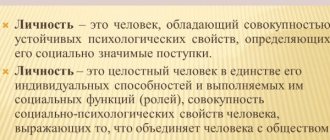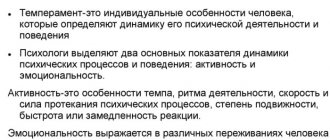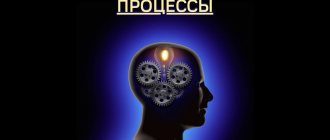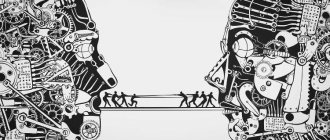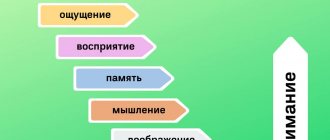Author: Eremchuk Lyudmila Gennadievna, neurologist. Researcher, Candidate of Medical Sciences.
Vital cognitive functions determine the level of personality in the social environment, attitude towards oneself and the quality of interaction with the outside world. Any everyday action is associated with the sphere of cognition and analysis, the work of the brain.
Cognitive neuroscience explores these manifestations in all their diversity, identifying the dependencies of the physical structures of nervous activity and human abilities. The development and training of memory, speech, and attention can improve the quality of life.
Even unconscious cognitive functions, such as background analysis of the situation around oneself, are the constant work of many neurons in brain structures. Neurobiology, namely its branch of cognitive neuroscience, is concerned with improving the ways in which these important cells of the body interact.
What does cognitive mean?
The concept of “cognitive” is a characteristic indicating the relationship of an object to the cognitive sphere controlled by the brain. Cognitive functions include the most complex functions in the field of higher nervous activity: writing, speech, analysis of the surrounding world, perception of reality, memory.
In the process of life, a person acquires and constantly improves cognitive skills, his cognitive characteristics, which determine what in everyday speech we call the level of intelligence. The closest thing to the concept of cognitive is the meaning of the word “smart,” which also means “developed, quick-witted.”
Definition
Cognitive abilities are a set of brain processes involved in understanding the world around us. With the help of them we perceive, process, sort, remember, store and reproduce information.
Cognitive abilities include:
- perception,
- attention,
- memory,
- thinking,
- speech,
- imagination.
These are those mental processes that help to effectively interact with information coming from the senses. All of them are closely interconnected and complement each other. If some process is lame, then others partially take over its function. This embodies the principle of flexibility and compensatory psyche.
When we characterize a person as “smart,” we are placing a high value on his cognitive abilities.
Heredity and congenital characteristics affect the quality of cognitive functions. But to a much lesser extent than was previously believed. A person’s purposeful work on their development plays a primary role.
This means that a person who has average innate abilities, but regularly trains his cognitive functions, will soon overtake someone who is naturally gifted, but does not develop his inclinations.
Cognitive functions and processes
The dynamic processes occurring in the brain, both consciously and in the background, are all cognitive functions. They allow a person to constantly receive new information, process it in accordance with his current goals and experience, and produce adequate solutions for each situation.
Thought processes occur in combination: for example, when writing a poem, a person simultaneously uses fantasy, inner speech, interprets emerging images, and remembers how to spell a particular word. However, when one of these activities is disrupted, the others can be maintained in a stable state.
Cognitive researchers have described many cases in which a patient's speech or memory impairment did not affect his or her writing, reasoning, or learning abilities.
Analyzing the information environment, adapting to the conditions of the surrounding world, and planning adequate goals is only possible if cognitive functions are developed and within the norms. Identification of violations allows further correction of individual processes and improvement of a person’s quality of life.
To screen for functional disorders of the mental-cognitive sphere, specially developed methods are used. One of the most common is the Montreal scale for assessing cognitive functions; it allows you to collect and interpret data on the main range of mental processes:
- conceptual thinking;
- counting, speech;
- attention and memory;
- executive activity;
- concentration;
- orientation in space.
The examination lasts only 10 minutes and provides enough material to assess the level of development, speed and adequacy of reaction and other indicators of cognitive processes.
Level of tolerance for unrealistic experiences
Tolerance means tolerating something. As a stylistic characteristic here, it characterizes a person’s ability to accept impressions that do not correspond or even contrast with his existing ideas.
Intolerant people tend to resist such experiences because... it is at odds with their knowledge of how things “should be,” while tolerant people, on the contrary, are open to this experience. The main indicator of tolerance can be called the duration of the period during which a person perceives a phenomenon.
By and large, we are talking here about the skill of accepting information that does not correspond to a person’s existing attitudes, and perceiving external influences as they really are.
Cognitive thinking
Starting from birth, a person trains cognitive abilities, learns to think and interact with the world. The activity of his brain improves through three main stages:
- visual-effective, in which the child studies objects visually and by touch and analyzes incoming data;
- visual-figurative - during this period, the assimilation of rules of behavior, basic logical principles, development of memory and speech occurs;
- abstract thinking - a person learns to operate with images and abstract structures.
Normally, all three stages pass before adulthood, but even at an older age you can develop cognitive thinking in any available way: learn to play chess, solve logical problems, develop calligraphic writing, read educational literature, solve crosswords.
A selection of educational board games and puzzles for adults and children
Cognitive psychotherapy
In the process of developing psychotherapy, a direction arose that explains mental disorders and disorders through thinking errors. Scientists who adhere to this theory believe that correcting stereotypes of perception, beliefs, and behavior patterns can help a person rethink difficult situations and remove internal negative factors.
Cognitive impairments and disorders
During the course of life, the cognitive functions of the human brain can not only develop, but also degrade, gradually or as a result of injuries and serious stress. Treatment is selected according to the severity, motivating reasons and age group, since some of these disorders are reversible.
When cognitive functions are impaired in adolescents and children, it is usually easier to restore the original level, since before reaching maturity, the damaged nerve connections are replaced more actively.
Narrowness and breadth
This implies the narrowness and breadth of the range of equivalence. Such cognitive styles characterize individual characteristics on the scale used by a person when evaluating the differences and similarities of objects.
Some people, when randomly classifying, can divide objects into many groups with a small volume of objects (this is a narrow range), while others - into a smaller number of groups with a large volume of objects (this is a wide range).
The basis of these differences is mainly the level of “sensitivity” to established differences and the focus on establishing differences of different types. A person with a narrow range of equivalence relies on the physical properties of objects, and a person with a wide range relies on hidden additional properties. Some domestic experts characterize the first style as analytical, and the second as synthetic. A connection has also been established between analytical and synthetic cognitive styles with personality characteristics.
Cognitive ability test from Vikium
Even short-term training of a number of cognitive abilities gives clear results. This is confirmed by research from the University of California. To understand how to improve cognitive and related brain functions, you must first determine your current level.
The most convenient way to do this is to use the Vikium service, which has established itself as the most advanced platform in this area. In a game form, it is proposed to devote only 15 minutes a day to the development of cognitive abilities. You can find time even with a busy schedule.
The program is compiled individually, since first the level of thinking is assessed in test form. The interpretation of abilities is built in relation to personal goals. This easily identifies the user’s needs, because as part of testing, it is proposed to indicate what exactly one would like to improve.
The advantages of the Vikium platform are the chosen unique approach to each user, since everyone has their own initial framework of cognitive development. In addition, the service’s training model is based on serious scientific developments.
The entertaining form of classes allows you to maintain interest in such a useful goal. In addition to individual puzzles, users can enter into competitions with each other. The choice of training is varied, you can play and develop for free, but the functionality and number of games will be limited.
If your goal is to seriously move to a new level of quality thinking, you can purchase an annual or permanent subscription and complete a full course of individually selected training.
Most of those who have developed cognitive abilities using Vikium platform simulators leave positive reviews on popular network sites. The service is also highly rated in reviews on this topic.
Wikium is constantly developing and adding to its functionality.
Development of cognitive abilities
The human brain, as a structure of interacting neurons, is very plastic and adapts to changes in external conditions and to the goals that its owner sets for himself.
If you set a goal, then regular training can lead to truly impressive results. You can act in standard ways, for example, learning long poems by heart or solving mathematical problems, or you can combine familiar methods with original ones.
Reflexivity and impulsiveness
These cognitive styles were identified in 1976 by another psychologist, N. Kogan, in the process of studying human intellectual activity in decision-making situations, which are characterized by conditions of uncertainty, and where several alternatives need to be considered in order to make a choice.
An impulsive person always reacts quickly to problematic situations, and also finds and accepts solutions without careful evaluation. A reflective person, on the contrary, reacts somewhat slowly, and makes decisions only after a thorough assessment and consideration of all the pros and cons. In addition, reflective people tend to use more effective ways to solve problems and more successfully implement mastered activity strategies in relation to new situations.
Exercises to develop cognitive abilities
The development of the cognitive and analytical sphere of the brain is useful not only for improving the quality of life, but also as a means of avoiding diseases that manifest themselves in the area of higher nervous activity.
Simple exercises to “pump up” cognitive functions will not take much time, but will be a good remedy against Alzheimer’s disease. It is best to treat them as a form of recreation or entertainment. Then they will become part of everyday life, and the benefits will be obvious. Below are examples of simple exercises that help develop different types of brain activity:
- Use your left hand to write if you are right-handed, and vice versa. This will improve the nerve connections responsible for coordination.
- Write a list of words that express emotions (laughter, pain, sadness, euphoria, etc.) and come up with a detailed definition for each. This activity promotes analytical and abstract thinking.
- Choose a simple drawing and study its lines for a minute. Then turn the sheet over and repeat it in as much detail as possible. The exercise trains visual memory.
- Make a chain of words in which each next one begins on the last syllable of the previous one. This lesson is aimed at improving verbal memory and associative thinking.
Field dependence and field independence
The first appearance of these styles in the field of science dates back to 1954, and is associated with the name of the American psychologist G. Witkin, who studied the relationship between proprioceptive and visual landmarks in perceptual activity.
Experiments conducted by Witkin showed that some people perceive incoming data through visual impressions, and some through proprioceptive ones, i.e. based on body position. The first trend was called field dependence, and the second – field independence.
Subsequently, field independence began to be considered as a skill to overcome the visible field, its structuring and isolation of individual elements in it. And in field dependence, all elements of the visible field are interconnected, and it is almost impossible to separate the details from the spatial background. So, if a person can quickly and correctly detect figures among others, then he is field-independent, and if he detects them slowly and with difficulty, then he is field-dependent.
As we studied, the skill of successfully identifying individual details from their diversity began to be associated with certain intellectual, mainly non-verbal abilities. Based on this, scientists came to the conclusion that there is a more general feature of cognitive style, which they called “the ability to overcome an organized context.” Based on how pronounced it is, two approaches to the field began to be distinguished - active (analytical) and passive (global).
It follows from this that field dependence and field independence reflect the specifics of performing tasks of a perceptual nature. Field dependence is characterized by the fact that a person’s reference point is external sources of information, and, therefore, he is most susceptible to the influence of context in the process of performing perceptual tasks, which is associated with a number of difficulties. And in the case of field independence, a person is focused on internal sources of data, due to which he is less exposed to the influence of context and performs perceptual tasks with greater ease.
Books for the development of cognitive abilities
Interest in the development of cognitive skills can be satisfied with the help of literature on this topic. A wide selection of books allows you to find the source that is right for you.
- . A serious publication that substantiates the postulates of the relationship between the physical structures of the brain and the cognitive abilities of the individual. Scientific data and results of modern research in psychology and related sciences are presented, the latest methods for studying brain processes in the transition from behavioral to visual are considered.
A. Soboleva. A series of books for the development of the cognitive sphere in children in a playful and accessible form. Three manuals are aimed at improving basic functions: speech, memory, motor skills, attention, and include tasks for children and advice for parents.
Read other useful articles on the site:
- How to better develop a child: a review of children's developmental techniques, games, objects and exercises
- How to develop your brain: exercises
- Top 16 sites for developing intelligence


